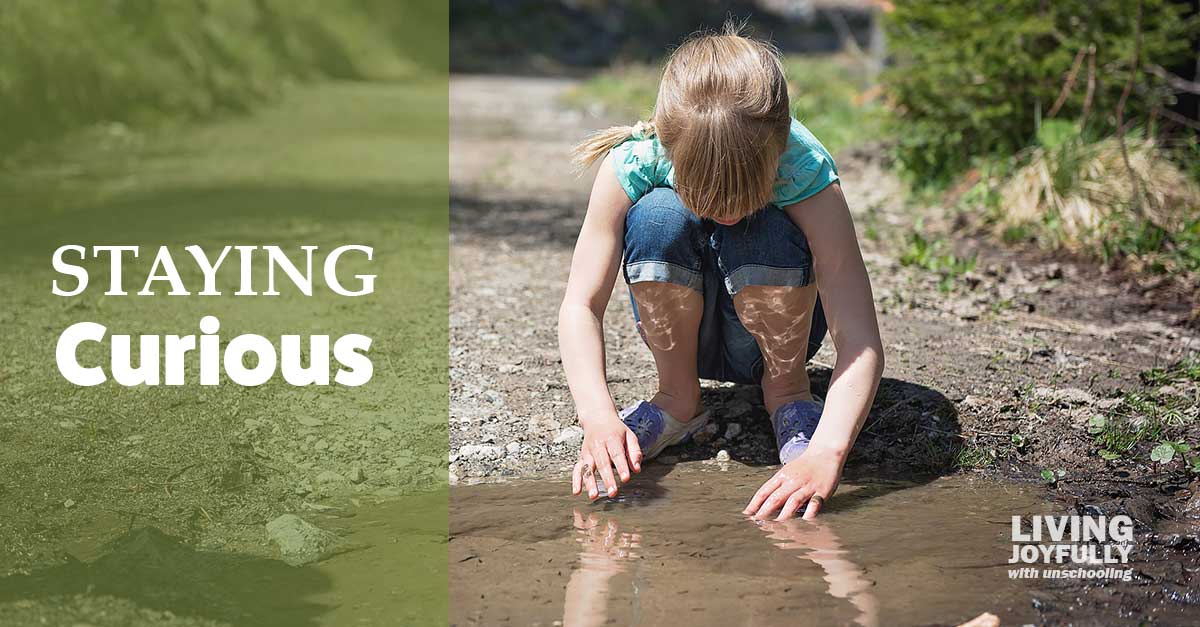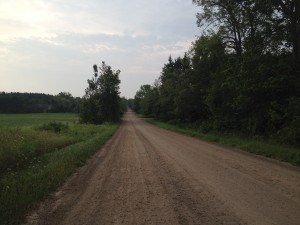
One of the most beautiful outcomes of growing up unschooling is that our children haven’t lost their curiosity about the world.
To keep their curiosity alive is to show them that their questions are important.
Even if it feels like the hundredth question we’ve answered in the last hour.
Even if sometimes we choose to keep quiet when (we think) we know the answer. I qualify that because the question they first voice may not be exactly the one in their mind—they’re still sorting that out, if we give them the space to do so.
Even if it’s messy. Figuring things out often is! We show them their process is valuable by not complaining about that. Why is our pile of books okay, but their pile of Lego is not? If it’s really an issue, we can help them figure out another way, rather than grinding their curiosity to a halt by insisting things are put away on our schedule, not theirs. (For example, we built a large table, at their height, with raised edges, for ongoing Lego play. Creative solutions.)
Even if … whatever!
To give them the space and support to explore their own questions is priceless.
It’s how they discover the deep satisfaction and joy inherent in learning new things. It’s how they discover that they can figure things out on their own. How they learn to trust themselves.
Over time they’ll also discover that you really never know what treasures you might uncover when you first set out. How many times have you started down one path only to soon find a branching trail you didn’t know existed? It’s the exhilaration of curiosity: You just never know what might be around the corner.
That’s what comes to mind when I hear the opening lines from one of my favourite MCR songs:
There might be something outside your window
But you just never know
There could be something right past the turnpike gates
But you’ll just never know
It revs my curiosity dial up to ten every time.

Now, I’m not saying that children who go to school are destined to lose their curiosity, but the odds are stacked against them.
The conventional educational system is designed around not only providing answers immediately, but telling children which questions to ask in the first place. It’s called curriculum. Some teachers may try, but it’s hard to veer very far off that course.
When kids ask their questions at school, they’re often told, “that’s not on the test,” or “we’ll cover that later.” And at home, once homework and extracurricular activities are done, they have precious little time to dive into the things they are personally curious about. What they learn from their day-to-day reality is that their individual questions really aren’t very important. That they aren’t capable of choosing good questions to ask.
The pull of curiosity weakens each time they aren’t given the opportunity to ask a question and see where it leads. And as they get older, they are so busy doing what’s been put on their plate that there’s little room to even wonder what they might be curious about!
Poof. Snuffed out.
However.
For those who’ve grown up unschooling, this curiosity plays out as an almost boundless zest for life.
Things actually continue to catch their interest, and they pursue them with delight to see where they might lead. They are often up to something interesting, and conversations with them go fascinating and unexpected places. (Take a moment to realize that actively following their interests doesn’t mean they need to often be out and about.)
So, if we want to cultivate a healthy level of curiosity in our unschooling children, we’d better want to cultivate it in ourselves too. We’re just as worthy of that joy! The unschooling lifestyle of living and learning is for the family, not just the children.
Yet many of us who grew up steeped in the conventional approach to life have probably developed an attitude best described as jaded indifference. In that mood, it’s hard to rekindle that fire of curiosity. Not impossible though. It’s like a weak pilot light inside of us, flickering. Waiting for us to fuel it with a question of our own making, hoping to burn in earnest as we seek out answers.
It needn’t be an earth-shattering question. Nor part of some big, passionate interest—that’s way too much pressure.
Just quiet things down for a while and listen.
Last week I asked myself a little question about a (new to me) TV show I’ve been enjoying the last few weeks. A quick Internet search and a half hour later I’ve learned they film in Toronto (that’s near me), and one of the stars grew up around here. And he’s engaged to one of the recent guest stars (work is a great way to meet people with similar interests—I met my husband at work). I also learned he enjoys photography and has been taking behind the scenes shots to share a fuller picture of what goes into the creating show—there were some really spectacular images. And I learned when the show comes back from its mid-season break, which was my initial question.
In that short time, I created a bunch of new connections—photography, geography, filming, love, work, story, characters, people—expanding and understanding my world a bit more, and I’ve given myself more points of reference to creatively draw upon in the future. And I had fun! (If you’re curious, the show is Suits.)
Being curious, asking questions, no matter how seemingly inconsequential, opens up our world. It’s a beautiful place.
And helping our children maintain their bubbling curiosity within a conventional society whose norms work systematically to dampen it, is a valuable part of our unschooling work.
Have fun!
***
Want to read more about curiosity?
Nurturing Curiosity — Human beings are wired to be curious. From the youngest age, children are driven to explore the world around them and figure out how it works. And then they can walk and life starts to get messier than just a dirty diaper. A child’s insatiable curiosity to engage with life doesn’t fade, unless the adults in the child’s life actively discourage it.
Excavating Our Curiosity — As curious adults, we exemplify the joy of digging into things we don’t yet know or understand. When your child comes to you to share their excitement over figuring out something new in their game or how they fixed their toy, your connection with them isn’t just over “cool, you did it!” but a deeper, stronger connection surrounding the joy of discovering new knowledge or skills. And that doesn’t happen unless you are discovering new stuff too.
Unschooling Means Spending Time with Your Children — Unschooling parents spend their days actively engaged with their children: playing games, answering questions, finding supplies, researching interests, exploring the community, bringing interesting bits of the world to their attention etc. And sometimes just quietly being with them. Does the thought of that fill you with anticipation or dread?

Ahh the joy of discovery!
Having kids gives us more entry ways into that delightful state.
Thanks for this article 🙂 Jazzy Jack
Right? I’ve learned so much from my children. 🙂